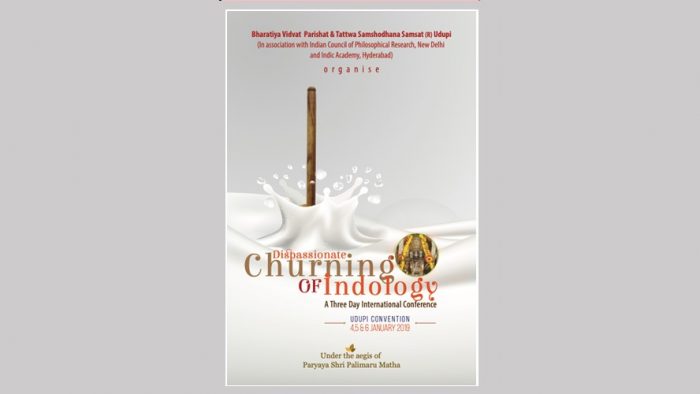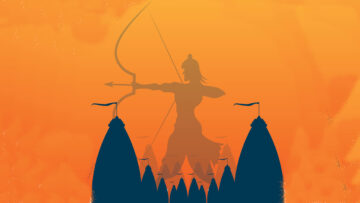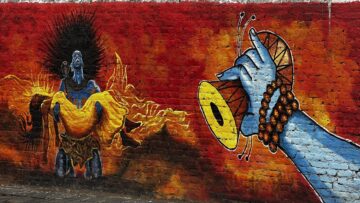The recently concluded three day conference – “Dispassionate Churning of Indology” was organized by Bharatiya Vidvat Parishad (BVP) and the Tattvasamshodhana Samsat, with support from Indian Council for Philosophical Research (ICPR), New Delhi and Indic Academy, Hyderabad in Udupi on 4th – 6th January 2019.
The carefully coined conference title by Prof Ashok Aklujkar, seemed like an ode to the the sagar manthan in purana given Udupi’s close proximity to the Indian Ocean. Not withstanding the practical challenges of combining modern expectations with spiritual ambience, the conference was a success with scholars debating, presenting and discussing various aspects of Indic studies. A total of 305 persons attended the conference, and 180 papers were presented in three days. The recordings of the sessions are available on YouTube.
Indic Academy had provided travel grants of upto Rs 10,000 to 5 deserving candidates to attend this conference.
The three days were an amalgamation of presentations, lectures/discussions, award ceremonies in the following order:
Day I
The conference was inaugrated with the traditional blowing of conch and other invocations followed by lighting of the lamp. The conference was blessed by respected Vishwesha Tirtha Swamijee of Pejawar Matha and Vidyadheesha Tirtha Swamijee of Paryaya Palimar Matha.
Keynote speeches were given by –
- Prof Veeranaryana Pandurangi, welcoming the scholars and briefly explaining the purpose of starting the group Bharatiya Vidvat Parishat (BVP), an electronic gathering of the scholars of Indic studies.
- Dr S. R. Bhat, the chairman of ICPR, explained the coinage of the term “Indology”.
- Prof Ashok Aklujkar, continuing from Dr. Bhat explained why the term Indology was used.
Dr Shrinivasa Varakhedi, author of Panchikar Prapancha released a booklet on the occasion, that described the word Indology alluding to the study of philosophy, history and culture. BVP also conferred awards and recognition to the following eminent scholars –
- Ashok Aklujkar – ‘Prachya-pratichya-vidya-vacaspati’
- M.A. Lakshmitatacharya – ‘Mahamahopadhyaya’
- Prof SR Bhat- ‘Darshanavachaspati’
- Prof PS Sheshagiri Rao- ‘Mahamahopadhyaya’
- Korada Subrahmanyam – ‘Mahamahopadhyaya’
Plenary Session I
Indology and Its Impact: Dr Nagaraj Paturi, Dr Nicolos Reiman, Dr Janardana Hegde and Dr Mrinal Kaul presented their views on Indic studies and its impact.
Paper Presentations I
This discussion was followed by individual Paper Presentations on various themes and topics –
- Philosophy and Research – Chair: Prof Dilip Loundo
- Vedic Studies – Chair: Prof Sundareshwaran N K
- Indological Reviews – Prof Nagaraja Paturi
- Manuscriptology
- Linguistic and Vyakarna
- Mahabharata/ Ramayana / Purana
- Sahitya
- Indian Science and Culture
- Nyaya and Vaishashika
- Dating of Brahadaranyakopanishat
The first day was concluded with a session Mahabharata Studies, and some of the key takeaways of the discussion were –
- Mahabharata is not only “itihasa”, history, but it is a spiritual document as well.
- Bhagvad Gita of Mahabharata has been studied more than the whole of Mahabharata.
- Like Ramayana, there are different versions of Mahabharata available. In Mahabharata itself, it is said that it was recording the events happening two generations prior to writing of Mahabharata.
- Not reading the manuscripts correctly has lead to distortion of the original story/ text. For example, in the movies and other Mahabharata depictions, Karna was blamed for calling Draupadi “vesya”. But the original word may have been “vasa”, not so common word for a cow. As a cow had a calf in about 9 months, Draupadi also had a child each year from a Pandava each, was the contention. This has been completely lost by mis-reading the manuscript and people not referring to the original work and believing that Karna used the word “Vesya”.
- While explaining his paper ‘Abhjnanana-Shankuntala – 225 years of Textual Criticism’, Prof Vasantakumar Bhat explained the methodologies he used to prove that the Kashmir’s manuscript was more authentic rendering of Kalidas’s poem than other manuscripts. The translations done since the past 225 years need to be reviewed and it was time to come up with better critical editions he opined. Based on the archaeological findings and comparative studies of different manuscripts available, the dating of Kalidasa can be safely put between 100 BC and 200 BC without ambiguity.
Day 2
Plenary Session II
Meta-Indological Studies: The participating Professors of this discussion were – KP Rao, Ashok Aklujkar, BVK Shastry and Balaganapati Devarakonda.
Dr. K. P. Rao was the first person to design the Indic keyboards, and he shared his journey in creating the keyboard for the Indic scripts and how the Indus script became the first Indic script in the computer.
Professor Balaganapati, part of ICPR delegation spoke about Meta-Indological studies, and Dr BVK Shastry defined Indology further. He talked about the symbolism of the conch sound and linked it to Indology with the beginning of puja and not a battle call.
Dr Ashok Aklujkar summarized the session and insisted that all Samskrit students, Indic students read “India and Europe: An Essay in Understanding” by Wilhelm Halbfas, a view on pre-Alexandar era.
Paper Presentations II & III
The list of papers and presentations on the second day as follows –
- Indian Science and Culture – Chair: Prof Shrinivas Varakhedi
- Vyakarana – Chair: Prof Ashok Aklujkar
- Education – Chair: Dr P. S. Ramesh
- Philosophy and Research – Chair: Prof Veeranarayana Pandurangi
- Sahitya – Dr Gopalacharya
- Samskrit and Science – Chair: Prof Lakshmi Tatachar, Prof Abhijit Joshi, Prof CS Yogananda, Prof Pratosh
- Mahabharata/ Purana – Chair: Dr M Narayana
- Nyaya Vaisheshika – Chair: Prof Korda Subramaniam
- Madhava Philosophy – Chair: Raghavendra Rachuri
- Miscellaneous topics – Chair: Dr JSR Prasad
There was a BVP Team Meet on day 2, where members had a meeting to take decisions on various subjects.
Mahila Vakyarthadas: A unique program, first of its kind, a Vakyartha was held among the women scholars – Ragini Sharma, Shvetanandini, Shruti, Chandrakala Kondi, Mridula Ashwin and Sangeeta Ramesh. This session was chaired by Smt Vijayalaskhmi Bhat. Each scholar explained different aspects of Vakyartha, meaning of vakya, Shakti, Lakshana etc and answered audience queries on Shabdabodha.
Day 3
Plenary Session III
Indology – What Next? : Professor JSR Prasad, Prof Dilip Loundo, Prof Sachhidananda Mishra, Dr Veeranarayana Pandurangi conducted this session.
Dr Dilip Loundo, who’s a philosopher from Brazil, on a Sabbatical leave currently in India since March 2018, shared his background and his interest in lndic studies and his current work of translating Upanishad into Portuguese. He touched upon various aspects like Universal history, Oral tradition, Language/Vach, Openness of text, Vidharma – contextual pedagogies, and the problem of authorship in Indian tradition with subjectivity of the presumed author.
Prof JSR Prasad took up the topic of ‘Ayurveda deals with Science’ in his session. The remaining speakers articulated upon different remedies for all that is ailing the Indic Studies currently through their own research and scholarly work.
In the valedictory session, a resolution was passed, which asked the Government to make manuscripts available and accessible to Indian scholars. This work from Prof Thathacharya along with the implementation of the resolution will definitely benefit Indic studies.
Brain-storming session on Indic Science: A workshop on Indic Science was conducted by Dr Shrinivas Varakhedi. Through questions and answers, he encouraged participants to think out-of-box and see what type of vision/ mission should we take up for Indic studies and Samskrit. A SWOT analysis was done in these interactions to understand where we are, what the end-goal is and how to achieve it.
Action Plan – Participants are to create their roadmaps for next 2 years and share. BVP will help them guidance in achieving the same. Review the MHRD Roadmap and use it as a guide for creating one’s own roadmap in the institute one is working.
Paper Presentations IV
The last day saw 5 parallel sessions of presentations, starting at 11 am, with the following as chairs – Dr Ganeshan, Prof Ganapati Bhat, Dr Rajendra Jain, Prof Gowri Mahulikar, and Prof Abhijit Joshi. The various topics covered were –
- Women Empowerment
- Kautilya’s Arthashastra
- Vedic Studies Session – Need to protect Mimansa and other topics
- “Consciousness” in Indic Studies
The paper presentation was followed by an open forum on – Samskritam Kasya? : This session was focused on women empowerment in Samskrit world. Shruti from Maitryee Gurukulam, Dr Shivani from KSU, Dr Sharada Narayanan, Ms Ragini Sharma from Bhopal, Dr Shantala Vishvas, all shared their journey in Samskrit world. All had a common theme to share; that there was no gender bias or background bias, when they got into studying Samskrit. They were encouraged to learn Samskrit and Samskrit has given them the success they could never imagine in the world.
The three day conference was wrapped up with valedictory session and concluding speeches by the scholars summarizing the conference and stating the resolutions and suggestions made for the progress of Indic studies.
Since the main theme of the conference was how Indic Studies have been perceived and interpreted by different people, and how there are distortions of truth, the following shloka from Bhartrihari captures the resolve and the intention best –
अम्भोजिनीवनविहारविलासमेव हंसस्य हन्ति नितरां कुपितो विधाता।
न त्वस्य दुग्धजलभेदविधौ प्रसिद्धां वैदग्ध्यकीर्तिमपहर्तुमसौ समर्थः।
Regardless of challenges thrown at us, the ancient knowledge given to us cannot be taken away.
Disclaimer: The opinions expressed in this article belong to the author. Indic Today is neither responsible nor liable for the accuracy, completeness, suitability, or validity of any information in the article.








